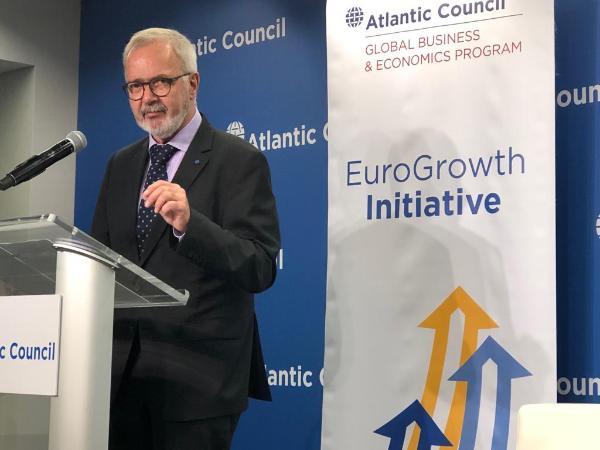
On the margins of the IMF/World Bank Group autumn meetings, EIB President Werner Hoyer opened the Atlantic Council’s EuroGrowth Initiative co-hosted event with a keynote address on ‘Financing the Energy Transition’.
He presented the new proposal for the EIB’s Energy Lending policy and outlined how it will support countries in their transition to a low carbon economy, thus reflecting the new EU climate and energy targets.
“It is a paradigm shift for an International Financial Institution, because the EIB is proposing the phasing out of our support to fossil fuels. The projects that the Bank is financing today will still be operating in 2040, 2050 and even beyond 2050. By then, we have to meet our 2050 target of “net zero” emission. We therefore need to ensure the correct direction of travel.”, he said.
Related articles
EIB President presented the EU Bank’s new ambition for 2030 to further support projects for climate action and environmental sustainability, built around three pillars:
- Increasing support for climate action and environmental sustainability from 25% to 50% of EIB’s global financing by 2025
- Unlocking at least USD 1.1 trillion of investment by 2030 for climate adaptation and resilience
- Aligning all EIB Group’s financing activities with the principles and goals of the Paris Agreement by the end of 2020
He confirmed the commitment of the EIB, as the EU Climate Bank, to support the European Green Deal of the incoming European Commission and its objectives to further increase decarbonisation efforts to make the EU the world’s first climate neutral continent by 2030.
"We must not forget that some countries are further advanced than others on the road to a low carbon economy. We are committed to ensuring no one is left behind.", President Hoyer concluded.
In the panel discussion that followed, Vice-President Andrew McDowell joined Helen Mountford and Alexis Crow to discuss the rationale behind the EIB’s position.
"Climate mitigation and adaptation are going to be the source of the legitimacy of an institution like ours - it is our new mission for the next generation", said EIB Vice-President Andrew McDowell.
He added : “One of the reasons why this discussion around our Energy lending policy has become so high profile and emotive is that people realise that this could become the technical template for what Paris Alignment looks like in practice. People anticipate this will become the higher standard.”
- Find out more about the EIB’s participation in the IMF/ World Bank Group annual meetings and follow the EIB updates via Twitter.

Photographer: Shirin Wheeler ©EIB
Download original